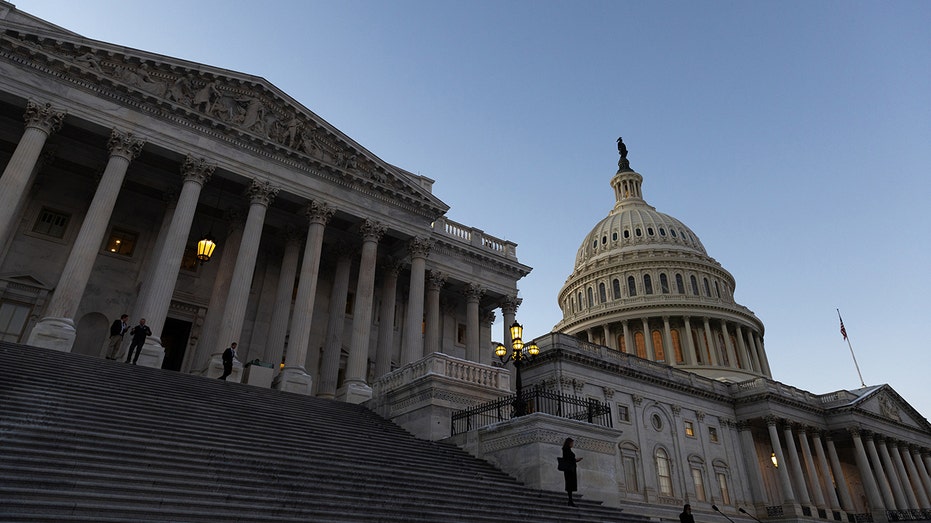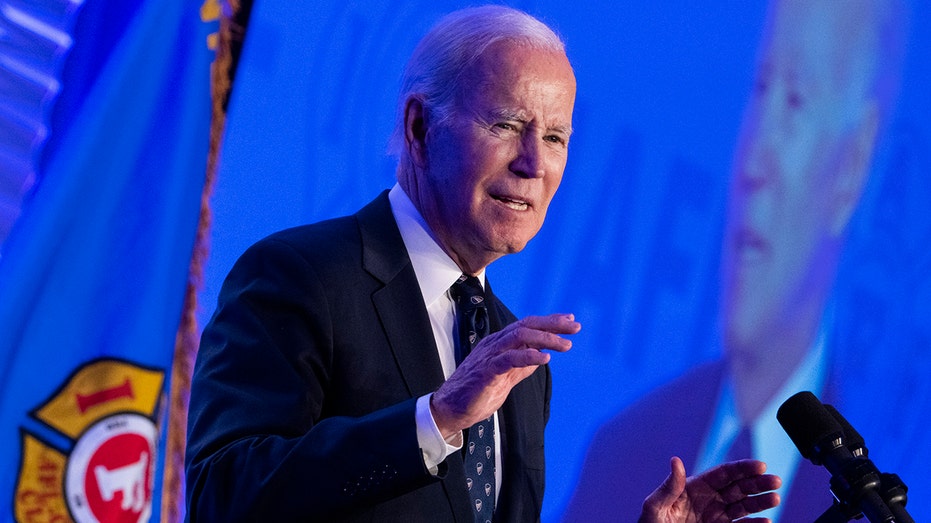Biden targets ultra-rich, corporations in latest tax proposal: Here's what's in it
Biden unveils proposal to raise taxes on billionaires, big corporations
Washington has a spending problem, not a revenue problem: Sen. Eric Schmitt
Sen. Eric Schmitt, R-Mo., discusses the Senate voting to overturn D.C.'s controversial crime law and addresses Biden's proposed tax increases on 'Varney & Co.'
President Biden proposed an array of tax hikes in his annual budget request to Congress that would dramatically raise the rates paid by corporations and wealthy Americans.
The president laid out the tax hikes Monday as part of his sweeping budget blueprint for federal spending in fiscal 2025, which begins in October. The higher taxes would be borne largely by Wall Street and the top sliver of U.S. households.
The proposals are unlikely to garner support in a deeply divided Congress, and face almost certain rejection from Republicans who control the House.
Altogether, the tax hikes would reduce the federal deficit by about $3 trillion. Money from steeper taxes would also help to pay for expensive new programs floated by the president, including a monthly tax credit to help some homeowners offset steep mortgage payments, subsidies for child care and lower prescription drugs.
Here is a closer look at some of the biggest tax hikes and most significant changes included in the measure:
REMOTE WORKERS FACE A DOUBLE TAXATION THREAT

President Biden speaks to African leaders gathered for the U.S.-Africa Leaders Summit in Washington, D.C., on Dec. 14, 2022. (AP Photo/Patrick Semansky / AP Newsroom)
Billionaire minimum tax
The president is pushing for a 25% minimum tax rate on U.S. households worth more than $100 million, or about 0.01% of Americans.
HERE'S EVERYTHING YOU NEED TO KNOW BEFORE FILING YOUR TAXES
Although the White House did not provide many details about the proposal, a previous billionaire minimum tax introduced by the president targeted both the income and unrealized capital gains of the ultra-wealthy.
Corporate stock buyback tax
Biden called for quadrupling the 1% levy on corporate stock buybacks that was added to the tax code in 2022 by Democrats as part of the Inflation Reduction Act.

The Capitol building in Washington, D.C., on Jan. 17, 2024. (Julia Nikhinson/Bloomberg via Getty Images / Getty Images)
The proposal would increase the tax from 1% to 4% and would reduce the differential tax treatment between share repurchases and dividends, the White House said.
Corporate tax increase
The budget proposal would lift the corporate tax rate to 28% from 21%, rolling back a key part of former President Donald Trump's 2017 tax law. The measure also calls to increase taxes that U.S. companies owe on their foreign earnings to 21% — nearly double the current 10.5% rate.
Payroll tax
Biden is also pushing to increase the Medicare tax rate paid by wealthy Americans.
YOUR TAX BILL COULD BE MUCH LOWER THIS YEAR - HERE'S WHY
The proposal would raise Medicare taxes from 3.8% to 5% on annual income above $400,000, according to a White House fact sheet. Biden also floated closing a loophole used by business owners and higher earners to shield some of their income from additional taxes. The loophole allows some high-paid professionals and other wealthy business owners to shield some of their income from tax by claiming it is neither earned income nor investment income.
Global minimum tax
The budget proposal called for implementing a global minimum tax that would require all multinational corporations to pay at least a 21% minimum rate on their earnings.

President Biden speaks during the International Association of Fire Fighters' 2023 Legislative Conference at the Hyatt Regency on Capitol Hill in Washington, D.C. (Tom Williams/CQ-Roll Call, Inc via Getty Images / Getty Images)
The minimum rate would stop "the race to the bottom on corporate tax rates" and level the playing field for U.S. businesses, according to the proposal.
Close carried interest loophole
Biden pitched closing a popular tax loophole used by private equity and hedge fund managers.
He called for repealing the break for carried interest, which allows private equity fund managers to pay lower taxes on their earnings than they would for regular income.
CLICK HERE TO READ MORE ON FOX BUSINESS
Under the loophole, an investment manager's income can be taxed as a capital gain — a 23.8% levy — rather than regular income, which is taxed at 37.9%.
Requiring fund managers to pay taxes on their profits would raise an estimated $63 billion over the next decade, according to a previous estimate from the Joint Committee on Taxation.





















